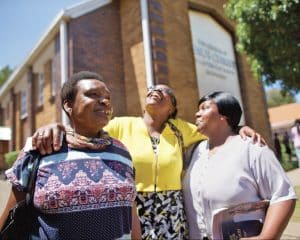Recently, my family was planning a celebration for my parents’ upcoming anniversary. We wanted to make it special for them, and one of my siblings suggested that we have the family sing “Families Can Be Together Forever” at the event. My first reaction was to advise against this. The reason was that this was more than just a family event. Old-time friends, former coworkers, LDS and non-LDS would be attending. I was worried that this particular selection could potentially wound more than it would celebrate. And I wasn’t most worried so much about it wounding non-LDS party-goers, as I know many friends not of our faith who believe they will be with their families in the afterlife. I was most worried about it offending those who were LDS but whose family situations were less than “ideal” from an LDS perspective.
While my parents have had all of their children graduate BYU and each one has married in the temple and remains active in the Church, I know that is not the case with many (most?) of their long-time ward members and friends. One of my mother’s best friends became so agitated she moved out of the ward because she couldn’t handle people asking about her daughter who was no longer in the church. Many LDS members of my parents’ generation have seen a lot to cause them heartache by this age, and it makes me realize that while the doctrine of eternal families can be one of the most beautiful and marketable aspects of our Church, it can also be a tremendous source of anxiety, fear, and despair. And this isn’t just experienced by empty-nesters: I have a friend who came from a part-member family and recounts that she was stricken with fear, grief, and shame each time in primary she had to sing “Families Can Be Together Forever,” knowing that our Church said she wouldn’t get to be with her non-member father after this life. To many who have family members who have made choices differently than how the Church directs, this doctrine can seem as if it definitively tears apart families, rather than keeping them together.
This is why I think it’s important in preparing this lesson to pay attention to the note in the lesson manual asking for sensitivity: “For teachers: As you teach this chapter and the next two chapters about families, be sensitive to the feelings of those who do not have ideal situations at home.” (Footnote, p. 207)
Your Relief Society may have people who have experienced divorce, death, childlessness, and empty-nests, and so along with the lesson manual, I would admonish you as a teacher to think of how you can cast your net wide and make this a peaceful, hopeful, and assuring gospel lesson for all the sisters you teach. I think the lesson manual has some wonderful questions and quotations, so here I’d like to focus on suggestions for adapting the lesson for those who *do not* have typical family situations or who no longer have children living at home, so that the material can be relevant to those beyond families where young children are present.
Note: To help distinguish between the lesson manual and my thoughts and additions, the lesson manual material will be presented in non-italic font, and my thoughts will be presented in italics. There is far more material here than you should be able to cover while maintaining a productive class discussion, so prayerfully select the portions that you feel will be the best for your particular class.
Opening: The beginning of the lesson talks about the value of children and families, especially the role they play in preparing us for Eternal Life. If you would like to have an opening that will serve as a nice segue into the first part of the lesson, one option is to create a two-column list. On the left, list life events that generally require preparation, such as: Going to grade school, Going on a mission, Going to college/university, Entering the work force, Entering retirement, etc. On the right side of the list, have the class brainstorm ways they or people they know have prepared for these life events. Then add one more item to the list on the left: Entering into Eternal Life. Have the class talk about how to prepare to enter into Eternal Life. You may get a lot of correct answers for this that fall along the general “Sunday School” answers: going to the temple, repenting, forgiving ourselves and others their trespasses, etc. However, one answer that hits most closely on this lesson is “To experience living with and learning with family members.” Because we are all part of an Eternal Family of our Heavenly Parents, having experience in earthly families can help us gain qualities we need to perfect ourselves.
Have sisters then list what qualities they have learned from living in families, either in the past or now. (You may wish to share the David O McKay quote about home preparation for Eternal Life, from the lesson manual, here.) Keep in mind that some sisters may not be currently living in “family” settings. Also keep in mind that some sisters may not have had a positive experience with their families growing up. Allow sisters to use words that can reflect that there are many lessons we can learn from living or dealing with family that can perfect our souls. Sometimes that lesson may include dealing with heartache or loss of something precious. I have a feeling our Eternal Parents also experience heartache and loss when their children use their agency to turn away from them, yet They also set the example of lovingly enforcing boundaries, showing forgiveness, never losing hope in Their children, and providing help and examples to ease us on our mortal sojourn.
The value of children:
“Every new child should be welcomed into the family with gladness. Each is a child of God. We should take time to enjoy our children, to play with them, and to teach them” p. 207
Consider asking the class: How can everyone, whether or not they are parents themselves, celebrate children?
The scriptures don’t provide evidence that Jesus was a father here on earth, yet Jesus was able to set some of the most powerful examples of how we should love and treasure children. How does this help us remember to love and treasure children?
You may want to present stories of Christ’s special interactions with children in the Gospels and also in 3rd Nephi . Remember that Jesus tolerated children when we was tired, took time to bless each one individually, and taught sternly about our need to protect them and not offend their innocence.
How can we as sisters in the Relief Society support families and show how we value children?
Possible answers may include offering support to children and their parents in the ward; volunteering in the nursery or primary; showing tolerance and helpfulness toward families with upset children at church, the supermarket, or other public places; Avoiding judgment and annoyance directed towards children or their parents; Recognizing each child as unique, and using the child’s name and preferences in conversation; donating children’s books or toys to YWCAs or homeless shelters.
President David O. McKay said, “With all my heart I believe that the best place to prepare for … eternal life is in the home” (“Blueprint for Family Living,” Improvement Era, Apr. 1963, 252). At home, with our families, we can learn self-control, sacrifice, loyalty, and the value of work. We can learn to love, to share, and to serve one another.
Why is the home the best place to prepare for eternal life?
As we learn self-control in our families, we also learn that ourselves are the only people we can control. Families are where we best learn that every member has her or his own agency. Sometimes when we share so much of the same background and environment, it’s easy to forget that family members are individuals. Families are great places to learn to allow people their individuality, just as our Heavenly Parents have granted us our agency to choose what choices we make and allow us to serve our unique missions.
Fathers and mothers are responsible to teach their children about Heavenly Father. They should show by example that they love Him because they keep His commandments. Parents should also teach their children to pray and to obey the commandments (see Proverbs 22:6).
How can we help the youth of the Church understand the sacredness of the family and the marriage covenant?
One of the best ways we can do this is by setting the best example from where we are in our life path. Jesus reverenced his parents by speaking of His Father often and showing how to best live His commandments. During Jesus’ final hours in mortality, his thoughts turned to his mother and her welfare. One of the best ways we can show our children to obey, show respect, and value what we value is to show through our lives and actions how important those values are to us.
The Eternal Family
Families can be together forever. To enjoy this blessing we must be married in the temple. When people are married outside the temple, the marriage ends when one of the partners dies. When we are married in the temple by the authority of the Melchizedek Priesthood, we are married for time and eternity. If we keep our covenants with the Lord, our families will be united eternally as husband, wife, and children. Death cannot separate us.
Loving Family Relationships
How can we develop greater harmony in our homes?
Husbands and wives should be thoughtful and kind to each other. They should never do or say anything to hurt each other’s feelings. They should also try to do everything possible to make each other happy.
As parents come to know God and strive to be like Him, they will teach children to love one another. In the Book of Mormon, King Benjamin explained:
“Ye will not suffer your children … [to] fight and quarrel one with another. …
“But ye will teach them to walk in the ways of truth and soberness; ye will teach them to love one another, and to serve one another” (Mosiah 4:14–15).
As family members we can help each other feel confident by giving encouragement and sincere praise. Each child should feel important. Parents need to show they are interested in what their children do and express love and concern for their children. Children should likewise show their love for their parents. They should be obedient and try to live the kind of life that will bring honor to their parents and to their family name.
What can parents do to encourage their sons and daughters to be good friends with one another? What can brothers and sisters do to nurture their friendship with one another? What can husbands and wives do to help each other be happy?
One of the General Conference talks that sticks most in my mind of setting an example of creating a loving family and home was given by Elder Cree-L Kofford called, “Your Name is Safe in Our Home.” In this talk, he describes the concept of keeping a person’s name “safe” at home. He says:
“What a blessing it would be if all of us could follow that counsel, if each of our names truly could be safe in the home of others. Have you noticed how easy it is to cross over the line and find fault with other people? All too often we seek to be excused from the very behavior we condemn in others. Mercy for me, justice for everyone else is a much too common addiction. When we deal with the name and reputation of another, we deal with something sacred in the sight of the Lord.
“There are those among us who would recoil in horror at the thought of stealing another person’s money or property but who don’t give a second thought to stealing another person’s good name or reputation.
“The old adage “Never judge another man until you have walked a mile in his footsteps” is as good advice today as it was the day it was first uttered. Someone once said,
“There is so much good in the worst of us,
And so much bad in the best of us,
That it ill behooves any of us
To find fault with the rest of us.”
(End Elder Kofford quote)
The first place to start to make a child’s, a parent’s, a sister’s, a brother’s, or a grandparent’s name safe is in our own homes. If we watch how we discuss others at home, even those who may not live within the walls of the home, that we are showing our family members that home is a place where we value and respect others in our Heavenly Family.
President Harold B. Lee taught, “The most important of the Lord’s work you will ever do will be within the walls of your own homes” (Teachings of Presidents of the Church: Harold B. Lee [2000], 134).
The First Presidency and Quorum of the Twelve Apostles declared, “Successful marriages and families are established and maintained on principles of faith, prayer, repentance, forgiveness, respect, love, compassion, work, and wholesome recreational activities” (Ensign, Nov. 1995, 102).
All of us want to have happy, successful families. The following things will help us achieve this:
To encourage class participation, instead of providing the list below, you may ask for class members to answer the question, “What are ways to encourage happy, successful families?” or follow up with “What are some of your happiest memories spend with family? What are ways to strengthen the family?” In addition to the list below provided in the lesson manual, consider ways that families can build positive memories and relationships with each other. These don’t have to involve a lot of money, but they often involve parents patiently teaching important concepts at critical opportunities, or involve peaceful, happy family together times (such as the “wholesome recreational activities” mentioned in the Proclamation on the Family).
- Have family prayer every night and morning (see 3 Nephi 18:21). Pray together as husband and wife.
- Teach children the gospel every week in family home evening. (Or, if they’re old enough, have children prepare lessons with parental oversight)
- Study the scriptures regularly as a family.
- Do things together as a family, such as work projects, outings, and decision making.
- Learn to be kind, patient, long-suffering, and charitable (see Moroni 7:45–48).
- Attend Church meetings regularly (see D&C 59:9–10).
- Follow the counsel of the Lord in D&C 88:119: “Organize yourselves; prepare every needful thing; and establish a house, even a house of prayer, a house of fasting, a house of faith, a house of learning, a house of glory, a house of order, a house of God.”
- Keep a family history, perform temple work together, and receive the sealing ordinances of the temple.
The family is the most important unit in The Church of Jesus Christ of Latter-day Saints. The Church exists to help families gain eternal blessings and exaltation. The organizations and programs within the Church are designed to strengthen us individually and help us live as families forever.
What can families do to work through difficult times?
What evidence have you seen that efforts such as family prayer, family scripture study, family councils, family meal times, and family home evening make a difference?
As mentioned in the opening of the lesson, one reason that families are the most important unit is because it is where we are most able to prepare for Eternal Life. You may consider asking, “For those of us who currently live outside of young family settings, alone or with roommates, who have grown children, etc., what are ways that we can learn these family lessons that will prepare us and perfect our character?” Some answers may include that when we live with our family, we have no choice but to deal with people both at their best and at their worst. We don’t always feel like we would pick our family members. Life gives us other opportunities for similar situations: our ward families, our roommates, our neighbors, our coworkers, members of organizations we belong to. We can learn many of the lessons we would learn in families by choosing to associate with people who are different and learning from them and reaching out with tolerance and respect.
Closing:For closing, you may choose to discuss organisms or objects that are very old in relation to everything around us. One of my personal favorites are bristlecone pine trees, which are the oldest single-living plant organisms in North America, and possibly on the earth.  Dating back almost 5,000 years, these trees were very old when Christ walked on the earth and calmed the elements with his command. It seems almost a miracle that something alive can persist that long. While we may not have lived that long, the family chains that have brought us here are as old, or even older. Just as each of us represents thousands of years of DNA that we inherit from our ancestors, family relationships can be perpetuated beyond the veil. This hope lies in our DNA, and it lies in our genealogical work we do for our ancestors. While everyone we do temple work for will have the agency to accept or reject the gospel message, we can take comfort that we are all part of an eternal family, and that our Heavenly Parents are willing to give all of us so many chances as we struggle to live the best we can.
Dating back almost 5,000 years, these trees were very old when Christ walked on the earth and calmed the elements with his command. It seems almost a miracle that something alive can persist that long. While we may not have lived that long, the family chains that have brought us here are as old, or even older. Just as each of us represents thousands of years of DNA that we inherit from our ancestors, family relationships can be perpetuated beyond the veil. This hope lies in our DNA, and it lies in our genealogical work we do for our ancestors. While everyone we do temple work for will have the agency to accept or reject the gospel message, we can take comfort that we are all part of an eternal family, and that our Heavenly Parents are willing to give all of us so many chances as we struggle to live the best we can.
At times when I struggle to feel my eternal worth, or I worry about how it will work out, I like to remind myself of this quote from President Hinckley:
“It all works out. Don’t worry. I say that to myself every morning. It will all work out. If you do your best, it will all work out. Put your trust in God, and move forward with faith and confidence in the future. The Lord will not forsake us. He will not forsake us. … If we will put our trust in Him, if we will pray to Him, if we will live worthy of His blessings, He will hear our prayers.” (Priesthood Session of Jordan Utah South Regional Conference, March 1, 1997.)
Additional Scriptures and Other Sources
Moses 2:27–28(man and woman created and blessed)
Genesis 2:24 (man to cleave unto his wife)
D&C 49:15–16 (God ordained marriage)
Ephesians 6:4 (train children in righteousness)
D&C 93:40–50 (the Lord commands parents to bring up their children in light and truth)
“The Family: A Proclamation to the World” (available on LDS.org and in many Church publications, including Ensign, Nov. 1995, page 102; For the Strength of Youth: Fulfilling Our Duty to God [item number 36550], page 44; and True to the Faith: A Gospel Reference [item number 36863], pages 59–61)
If you have other ideas for openers, closers, or ways to keep the class discussion going, please feel free to add them in the comments.
Note: This lesson was originally written for the Relief Society audience in 2010-2011, when the Gospel Principles manual was temporarily used as curriculum for Relief Society, Elders Quorum and High Priest classes. The lesson may require adaptation for Gospel Principles classes, which are mixed gender and primarily serve new members and investigators of the church.






18 Responses
This post reminded me of a quote from Brigham Young that basically promises that parents will be able to rescue children who stray. Are you familiar with that quote? This lesson seems like the place to bring it up.
It makes more sense to me than the must be sealed and worthy concept, to think of the afterlife in terms of What Dreams May Come (the book by Richard Matheson) where he describes an afterlife where people are reunited to their loved ones based on affinity and mental connection. Thinking that way, the sealing ceremony acts as a statement of intent, a way of saying “I love my family so much that I truly do wish to be with them when this life is over.” If they are sealed and do not have that psychic affinity with one another, I do not believe the sealing acts to binds individuals to family members but rather the connection to the larger human family.
Still not what I meant. By your reply, however, it seems you are *agreeing* with me that the doctrine and temple rituals are cruelly divisive. A civilly, legally married gay couple with a child will never be an eternal family according to LDS doctrine, policy, and temple practice. So it is, in fact, a lie that “families can be together,” unless one admits prejudice.
I understand what you mean. And that is currently what the practice and policy is in the Church. And that causes some very real hurt to people who are not in a traditional Mormon family.
I do have to take issues with saying some people will “never” be an eternal family. While it is highly unlikely that the LDS Church will begin doing sealings for gay parents, single people, or even women who have a previous sealing, just because we can see what the policy is right now does not mean we can predict what it will be 10, 20 or 100 years from now. And one thing many LDS are told regarding sealings is that God will sort it out in the afterlife. This was told to my grandmother (step-grandmother, actually) when she wanted to break her sealing to her first husband to be sealed to my deceased grandfather (her second husband). She was told she couldn’t do it, but that it would be likely God would seal her to the right man in the afterlife. If God can do this for my grandmother, then why couldn’t it be done for others who aren’t sealed in this life?
I’m not saying this is a great consolation, at least for this present life. But I just don’t think we can really say here and now how families will be formed, and if anyone will be excluded from forming an eternal family. I am not even sure exalted beings have sex or reproduce like mortal mammals, so in my mind there’s a whole open range of possibilities. We just don’t know.
Alisa–my understanding is that your step-grandma may be sealed to her second husband (assuming she’s deceased). allowing both sealings to exist on record. I believe this is especially good for women who’s husbands died young, then remarryied someone with whom they spent their mortality and parented children.
The gospel “truths” are simple. Let’s not let words cloud the simple truths. A family unit has been defined as a man and woman. Your example of a gay couple who is legally married in this life does not, according to the gospel fit the definition of “family”.
I have two brothers who are gay, and my parents are divorced. We are sealed as an eternal family and it is not for me to decide or rationalize or try to second guess the Lord or his judgement. There are many things we do not and will not understand in this life. One thing I know for sure, Heavenly Father loves me, my brothers, and my parents, and his judgement will be just. He knows our hearts!
I hope the Lord will be more than just. I hope the Lord will be infinitely merciful. None of us truly get what we personally deserve.
The Church may currently define your family with divorced parents as an eternal family, and that is great that it has such an expanded definition. I love that the Church has chosen to expand and re-expand the definition of an eternally-sealed family over the generations. It wasn’t until 1978 when people of African origin could be considered eternal families and get the blessings of the temple, but finally the Lord was asked and revealed many great blessings to those who were previously denied “eternal family” status and definition.
Reading the comments about this lesson on eternal families has saddened me greatly. Considering that God is the same yesterday, today and forever it appears that the principle of eternal families and our ability to obtain that blessing will continue to be based on our obedience to the laws that pertain to it. Simply being uncomfortable with the requirements does not exempt us from them. If we choose to stray from the requirements and are not worthy of the blessing we suffer the consequences. In other words we DO NOT recieve the blessing. “I the Lord and bound when ye do what I say, but when ye do not what I say ye have no promise.” (D&C82:10) If we were going to be with our families and friends for eternity without the sealing ordinances why be sealed at all? Simply wanting it to be so does not make it so. Many of my own family have strayed from the teachings of the gospel, many of my friends are not members of the LDS church. It behooves me to do all that I can to bring them to a knowledge of Jesus Christ so that I can be with them forever and it should be done in a loving and Christlike way. I agree with Elizabeth when she says “it does no good to denigrate the Church and it’s teachings” because in reality you are denigrating Christ and His teachings. Picking and choosing what commandments and principles we agree with and choose to obey is dangerous and unproductive and will only bring heartache. Having a firm testimony of Christ and His atonement, His Gospel and His prophets will keep us squarely on the straight and narrow path. Having faith in Christ allows us to trust Him and His love for us. The laws of God are fixed, all of them. Our responsibility, if we expect the blessings, is to be obedient to them, all of them.
“God is the same yesterday, today and forever” and isn’t it great that God will reveal to us many great and important things pertaining to the Kingdom of God (the Church)? I love that our Church believes that we have many (not a few) great and important (not tiny and miniscule) changes and revelations coming our way–many that we probably can’t even fathom! God is infinite and wonderful that way.
Right now firefox automatically downloads an mp3 and opens it. I want it to prompt me with the dialog box so I can choose where to save it. I’ve looked in options->downloads->view and edit actions and there is nothing set there that I can change..